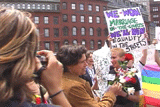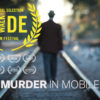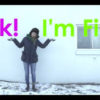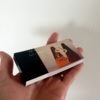
Filmmaking | Interviews | Massachusetts
From Written Word to Moving Image
Written by David Pierotti | Posted by: erin
Although Beth Healy is an experienced investigative journalist for The Boston Globe, where she specializes in financial reporting, the battle for gay marriage in Massachusetts captured a part of her imagination that went beyond the printed word. She grabbed a video camera and started filming. The resulting short film, To Have and To Hold, debuted at Boston Film Night and has inspired Healy to think about a second film project. NewEnglandFilm.com recently caught up with Healy to learn more about making this storytelling transition.
David Pierotti: Tell me about this transition you made from print journalist to filmmaker. Was this something you were always interested in or did a moment inspire you?
Beth Healy: I went out with my camera the day that [gay] marriage became legal in Boston and Cambridge and it just went from there. I wasn’t sure exactly what I wanted to do… but I knew I wanted to get it on film.
DP: The footage is from several years, right? When gay marriage first became legal and then the ensuing battle in the state legislature?
Healy: Yes, that’s right.
DP: Were you working this story as a journalist or were you pursuing it on your own?
Healy: I just grabbed my camera and learned on the fly.
DP: What kind of things did you learn about filmmaking?
Healy: One was how close you need to be to your subjects. As you saw in the film, I was really in the thick of it, and I wanted to present the extremes of both sides — so you have to kind of get in people’s faces. It’s funny, I’m used to doing that as a reporter but it’s another skill to be able to do that with a camera.
DP: Some of the people you interviewed voiced extreme anti-gay positions. Is it difficult to remain objective when confronted with situations like that?
Healy: I think my training as a reporter probably helped me. I get intrigued by people’s views and I think it’s obvious that I wasn’t purely objective. I think I showed some of the ugliness involved in the gay marriage issue and I was okay with that coming across.
DP: The film seemed to require a lot of editing. Was that something you did yourself?
Healy: Well, I started with [Adobe] Premiere but have since learned that you’re supposed to use Final Cut. I taught myself over the course of months. I tried to be very rigorous and to keep it as short and as strong as I could make it. I learned a lot and hope it will be easier for the next film.
DP: Can you comment on the decision to not have the typical talking heads?
Healy: Yeah, I thought the visuals were so powerful… the words and arguments were in the newspaper and on TV everyday.
DP: You used a song from the Indigo Girls, did you contact them for the rights?
Healy: I got in touch with them and asked their permission and sent them copies of the film. I also started the process of contacting their agent. I made sure they knew it was a nonprofit.
DP: Are you doing more film festivals?
Healy: I am submitting to the Rhode Island Film Festival and then I’m looking to start another project.
DP: So is this starting a new career?
Healy: I still love my day job but I love to tell stories and I think film is a powerful medium for doing so. I hope I get a chance to do some more and work with others who have more experience.
DP: Is there an overlap between the journalism and filmmaking?
Healy: I think so. These days I think people are more attuned to visual images than perhaps they are to written stories.











